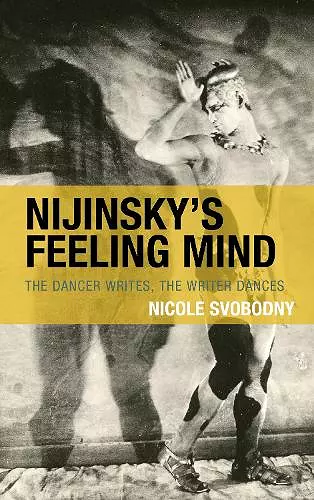Nijinsky's Feeling Mind
The Dancer Writes, The Writer Dances
Format:Hardback
Publisher:Lexington Books
Published:3rd Jul '23
Should be back in stock very soon

Nijinsky's Feeling Mind: The Dancer Writes, The Writer Dances is the first in-depth literary study of Vaslav Nijinsky's life-writing. Through close textual analysis combined with intellectual biography and literary theory, Nicole Svobodny puts the spotlight on Nijinsky as reader. She elucidates Nijinsky's riffs on Tolstoy, Dostoevsky, and Nietzsche, equating these intertextual connections to "marking" a dance, whereby the dancer uses a reduction strategy situated between thinking and doing. By exploring the intersections of bodily movement with verbal language, this book addresses broader questions of how we sense and make sense of our worlds. Drawing on archival research, along with studies in psychology and philosophy, Svobodny emphasizes the modernist contexts from which the dancer-writer emerged at the end of World War I. Nijinsky began his life-writing—a book he titled Feeling—the day after the Paris Peace Conference opened, and the same day he performed his "last dance." Nijinsky's Feeling Mind begins with the dancer on stage and concludes as he invites readers into his private room. Illuminating the structure, plot, medium, and mode of Feeling, this study calls on readers to grapple with a paradox: the more the dancer insists on his writing as a live performance, the more he points to the material object that entombs it.
With this daring dive into Nijinsky’s notebooks, Nicole Svobodny not only illuminates the interior life of a celebrated dancer and choreographer, she reveals how Nijinsky’s practice of dancing compelled him to critique and create in the realm of ideas. In Svobodny's thorough account, Nijinsky’s notebooks appear as one face of a multimodal art project—involving dancing, writing, and drawing—whose interlocking pieces break down easy dichotomies between interiority and exteriority, thought and feeling, writing and dancing, and in so doing, enact (both performing and representing) the creative process as a key to healing a world ravaged by war. Here, the sensory education dancing provides—the Feeling—serves as both an engine of philosophical insight and the vital experience capable of helping audiences choose life over death and love over hate. By further considering Nijinsky’s multimodal project in relation to Russian literature and events of his time, Svobodny highlights Nijinsky’s ongoing relevance as a dance artist and thinker.
-- Kimerer L. LaMothe, author of Nietzsche’s DancersMany might agree that Nijinsky, famous for his deific leaps, was the greatest male ballet dancer of the early twentieth century. But what do we really know about him? A sleuth might learn that after 1919, Nijinsky never danced publicly again. Svobodny unveils the secrets of what transpired before Nijinsky, a diagnosed schizophrenic, imprisoned himself in a catatonic bastille of silence. In her brilliant book, Nijinsky’s Feeling Mind, Svobodny unearths Nijinsky’s writings to give readers access to his interior landscape. She releases Nijinsky’s voice, which navigates the space between ‘the poetics of dance’ and the ‘somatics of literature.’ Her lucky readers will live within the dancer’s psyche, and prance through his insights into writers, like Tolstoy, Dostoevsky, and Nietzsche. Readers will emerge with epiphanies that extinguish the boundary between dance and literature, and with visions of varied modes of art fusing into one.
-- Amy D. Ronner, St. Thomas UniversityIt is an immense pleasure to follow the amazing and stimulating connections between Nijinsky's worlds which are at the same time dancerly and literal (verbal and notational). Nijinsky’s FeelingMind: The Dancer Writes, The Writer Dances allows these worlds to flower and, thus, allows the artist to live through the different aspects and volumes of his creativity, i.e., the panorama of his ethical, (e)motional, and physical awareness and attentiveness.
-- Claudia Jeschke, Salzburg UniversityBrimming with previously unknown archival detail, Nijinsky’s Feeling Mind opens a door not only onto Nijinsky and his milieu but onto Russian and European modernism.
-- Anca Parvulescu, Washington UniverISBN: 9781793653536
Dimensions: 238mm x 157mm x 27mm
Weight: 721g
386 pages